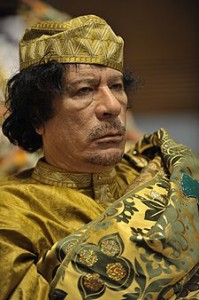Increasing Efforts To Ouster Gaddafi – OpEd
By Press TV
By Mohyeddin Sajedi
Are the international meetings Qatar and Egypt regarding the Libya crisis and the resumption of the bombardment of Gaddafi’s military forces by the US signs that new steps are being taken to put a quick end to the situation in Libya? Especially since Libya is facing civil war and partition, a situation that would definitely affect Libya’s neighboring North African countries.
The group that met up in Qatar held a meeting at a time when military developments in Libya had come to stand still and major changes in frontline positions where minor.
The fact that Italy was chosen as the location of the next summit shows that the international community and Western countries are serious about resolving the issue in Libya.
The African Union was not successful in drawing up a peace plan and since the Revolutionary forces placed the removal of Gaddafi from power as a precondition to any negotiated deal, the AU deal failed. The deal did not mention of a time frame when reforms would be implemented and it did not specify the power transfer process.
The Turkish plan, which was raised in Doha, also did not guarantee the removal of Gaddafi from power. For the revolutionary movement coexistence with Gaddafi or any family members of his is not even imaginable. Any form of power sharing with Gaddafi would translate into the complete takeover of power by him. History has shown that his political and ideological thinking does not leave room for collective opinion.

The revolutionary movement did not reach two of its goals in the Dubai summit. First of all the international and regional community were not prepared to refer to the revolutionary forces as the only legitimate representative of the Libyan people and only referred to them as the legal negotiation side.
This shows that a consensus does not exist among Western nations regarding who should be responsible for the future of Libya. But still there was no disagreement on the fact that Gaddafi had lost legitimacy in the summits of Doha and Egypt, as well as in the Arab League headquarters.
The second goal of the revolutionary forces was to acquire arms. The statement that stipulated ‘Libyans should be helped to defend themselves’ does not mean arming the revolutionary forces to the Germans and the French. But other governments like Qatar believe that the above statement is enough for them to send arms to the revolutionary forces in Libya. Qatar was the first Arab nation that expressed its support of a no-fly zone over Libya.
The Libyan government claims Qatar has sent military specialists to Libya and has armed them with French anti-tank missiles. They also claim that Hezbollah operatives in Misratah, a city under Gaddafi’s surrender that is in danger of a great humanitarian catastrophe.
The existence of conflicts in the east of Libya does not mean Tripoli is calm. Roughly 75 percent of the Libyan population live in the western cities that are surrounded by Gaddafi’s forces. The shortage on fuel and food supplies is beginning to show itself. The government is trying to fight a lack of liquidity and cash flow by increasing bank interests. People are only allowed to take out limited amounts of cash out and rationing of necessities has been increasing. Each vehicle is allowed to get one full tank of gas a week. The European Union has embargoed more companies in Libya which was aimed at sanctioning Gaddafi financially.
The same problem exists for the revolutionary side which is now trying to get Western governments to allocate to them the $120 billion in blocked funds from Gaddafi. This has been faced with legal obstacles so far. The other method is to sell oil and use the income; this has become available now. Qatar is the first nation that has begun purchasing Libyan oil from revolutionary forces.
We hear of Qatar everywhere. The al-Jazeera news channel, which played an important role in the Arab uprising, is not enough for this small kingdom and she seeks to expand her position in the international community. Their chances of playing a more influential role have been enhanced with the recent development in Egypt and the decline of power in Saudi Arabia despite the fact that there is no sign of political country there. This can be seen in the [Persian] Gulf Cooperation Council (PGCC) which Qatar is a member of. The council was the first to approve military intervention in Libya but it was quick to send troops to Bahrain to quell the uprising there. They have not been able to change the situation in Bahrain however because the Bahraini king is not offering a political solution out of the deadlock and there hasn’t been any form of negotiation between the opposition and the Bahraini government since the invasion of Saudi and Emirati troops.
The military intervention in Libya also faced opposition from China, Russia, Germany, and other European nations. NATO’s experience in Libya shows that the treaty is not able to effectively carry out strikes on Gaddafi forces in Libya without the participation of the US to a point where the revolutionaries of the country criticized NATO.
Does the resumption of airstrikes on Libya change anything? Senator John Mc Cain thanked Britain and France for their part in Libya but said that the in reality the United States was in fact NATO.
